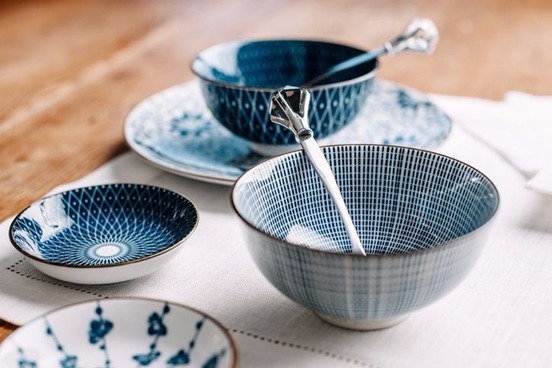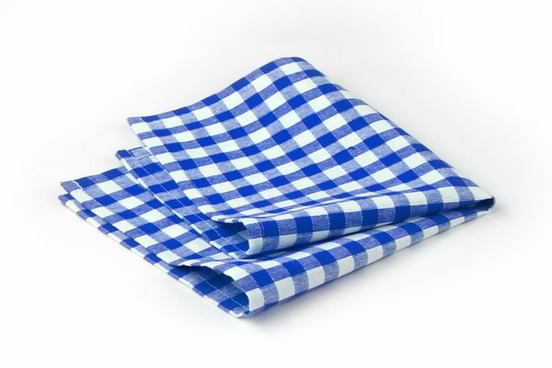
Dish
The word dish has a variety of meanings pertaining to what goes on the table. There are the vessels from which food is served ("potatoes are in the covered dish there"); the contents of that vessel ("a dish of green beans"); and food prepared in a particular way ("the recipe for a dish my grandmother used to make").
But if we push our chairs back and consider other meanings of the word, there's a curious one that we may perhaps be able to blame the ol' Bard himself for:
[Mark Antony] will to his Egyptian dish again; then shall the sighs of Octavia / blow the fire up in Caesar ….
— Antony & Cleopatra, 1607
Mark Antony's Egyptian "dish" here is of course Cleopatra. (The speaker is speculating that Mark Antony will betray his wife, Octavia, for Cleopatra, which will upset Octavia and her brother Caesar.)
Though Shakespeare may have been the first to try out the "an attractive or sexy person" meaning, the Oxford English Dictionary reports no examples of this use of dish between his time and the 1920s. In that gap of centuries, dish developed meanings in a similar vein, however, among them "something one particularly enjoys," "something favored," and "gossip":
In the autumn, new trials and experiences came to Meg. Sallie Moffat renewed her friendship, was always running out for a dish of gossip at the little house….
— Louisa May Alcott, Little Women, 1868-9

Tumbler
A tumbler is a drinking glass that, unlike the typical wine glass, doesn't have a stem or foot. The original tumbler was a trickier beast than the ones we know today: it had a pointed or concave bottom that made putting it down before you'd downed the contents rather inadvisable. Learning this historical feature makes the object's relation to the verb tumble suddenly clear.
The tumblers described in this passage from Moby Dick are tricky for an entirely other reason:
Abominable are the tumblers into which he pours his poison. Though true cylinders without—within, the villanous green goggling glasses deceitfully tapered downwards to a cheating bottom. Parallel meridians rudely pecked into the glass, surround these footpads' goblets. Fill to this mark, and your charge is but a penny; to this a penny more; and so on to the full glass—the Cape Horn measure, which you may gulp down for a shilling.
— Herman Melville, Moby Dick, 1851

Spoon
The word spoon in its earliest uses referred to a thin piece of wood—a splinter or chip—the same meaning that its Old English forbear spōn had, but it's referred to the eating or cooking implement with the shallow bowl and relatively long handle since the 14th century.
While we think spoons are marvelous, the word has also been applied as an insult suggesting a relationship between one's intellect and the shallow depth of a spoon. This slang use of spoon to mean "simpleton" or "simple-minded person" was mostly a 19th century phenomenon:
To get all the advantage of being with men of this sort, you must know how to draw your inferences, and not be a spoon who takes things literally.
— George Eliot, Middlemarch, 1871-2
The adjective spoony, meaning "silly, foolish," "unduly sentimental," or "being sentimentally in love," is an extension of this meaning.

Napkin
The -kin of napkin means "little," like in minikin (an underused word for a small or dainty creature); the nap comes from the Anglo-French word nape meaning "tablecloth." Etymologically, then, a napkin can be considered to be like a little tablecloth, but for your body instead.
In George Bernard Shaw's Pygmalion, Professor Higgins is called out by his housekeeper, Mrs. Pearce, for what he uses as a napkin stand-in:
MRS. PEARCE. Yes, sir. Then might I ask you not to come down to breakfast in your dressing-gown, or at any rate not to use it as a napkin to the extent you do, sir. And if you would be so good as not to eat everything off the same plate, and to remember not to put the porridge saucepan out of your hand on the clean tablecloth, it would be a better example to the girl. You know you nearly choked yourself with a fishbone in the jam only last week.
— George Bernard Shaw, Pygmalion, 1913
The related word napery refers to household linen and especially to table linen (which, incidentally, doesn’t have to be made of linen).

Silverware
Most of the time silverware isn't silver at all. One can, in fact, even buy plastic silverware.
But originally, the word silverware referred to utensils for the table that were made of or plated in silver. Now, it most often refers to what the clerk at your local department store will assure you is flatware. Flatware refers to relatively flat tableware (tableware being a broad term that refers to utensils of any material that are designed for table use); flatware is contrasted with hollowware, which refers to bowls and cups and vases and the like. Hollowware also, it is worth noting, has the charming feature of having two w's in succession.
Rector's, with its polished marble walls and floor, its profusion of lights, its show of china and silverware, and, above all, its reputation as a resort for actors and professional men, seemed to him the proper place for a successful man to go.
— Theodore Dreiser, Sister Carrie, 1900
The ware in all these words is the same ware in "selling one's wares at the market."

Cutlery
In strictest use, silverware doesn’t include knives. The word cutlery does that job.
Originally cutlery referred to the business of a cutler—that is, the business of making tools for cutting (and especially for cutting and eating).
He watched the deer in Windsor Forest and admired the Thames from Richmond Hill; he ate white-bait and brown-bread and butter at Greenwich, and strolled in the grassy shadow of the cathedral of Canterbury. He also visited the Tower of London and Madame Tussaud's exhibition. One day he thought he would go to Sheffield, and then, thinking again, he gave it up. Why should he go to Sheffield? He had a feeling that the link which bound him to a possible interest in the manufacture of cutlery was broken.
— Henry James, The American, 1876

Runcible Spoon
They dined on mince, and slices of quince, / Which they ate with a runcible spoon; / And hand in hand, on the edge of the sand, / They danced by the light of the moon.
— Edward Lear, "The Owl and the Pussycat," 1871
No one knows exactly what Edward Lear was picturing when he portrayed a newly-wed owl and cat eating mince and quince with the aid of a runcible spoon, but the word eventually came to refer to a sharp-edged fork with three broad curved prongs.
Lear applied the word runcible in other contexts as well, though none of those has caught on. Hats, moons, cats, and geese are all described as "runcible" in Lear's work, but what that means exactly is unknown.

Saltcellar
It is the custom that every Wednesday (which, as I have before observed, was their Sabbath) the King and Queen, with the royal issue of both sexes, dine together in the apartment of his Majesty, to whom I was now become a great favorite; and at these times my little chair and table were placed at his left hand, before one of the salt cellars.
— Jonathan Swift, Gulliver's Travels, 1726
Long before we had saltshakers (current evidence dates that word to the late 19th century), we had saltcellars, which are small containers for salt that one uses at the table. Saltcellar dates to the 14th century and existed first in the form salt saler; the saler part of that comes from Latin salarius, the source of our word salary. Members of the Roman army at one time received an allowance of money for salt that was referred to as a salarium; this beat being paid in actual salt.





